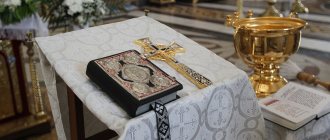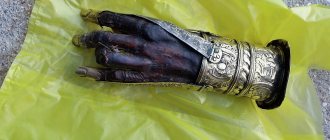The concept of prayer for health in Orthodoxy
A prayer service in an Orthodox church is ordered for almost any need of a Christian, from the successful purchase of a house to the repose of the soul of a deceased relative.
Such a ritual has great power, since it is performed not only in the presence of the clergy, but also of all parishioners of the temple, and the Holy Scriptures indicate that when two or three are going to ask for the same thing, the Lord is among them.
If a believer wants to order a prayer service for the health of a loved one, this is quite simple to do - just come to the church and leave a note in the church shop, describing your request in it. However, the concept of “health” includes not only a person’s physical health, but also his spiritual and psychological state, as well as his financial situation.
A prayer service is a special type of service in which prayer requests are made to the Almighty, the Virgin Mary and the saints for the sending of mercy or thanks for a blessing already received.
You can order such a prayer in a church by submitting a note to the church shop. It indicates the type of prayer (petition or thanksgiving), as well as to whom it is addressed. If a prayer service is ordered for several saints at the same time, be sure to indicate the name of each. After this, the note indicates the name of the person (or several people) for whom you need to pray.
In its composition, the prayer service is an abbreviated matins, and its main parts are the Gospel, litany, troparia, canons and prayer.
It is important to remember that notes can only be submitted for those people who have been baptized in the Orthodox Church. During the service, for each person mentioned in the note, the priest takes out particles from special prosphoras, which are later dipped into a cup of wine, symbolizing the blood of Jesus Christ. At this moment, a prayer is read for the forgiveness of sins.
You can order such a prayer for health on any day when it is not prohibited by the Orthodox Church. For example, if it is Lent, then such a prayer is said only on Saturday or Sunday. Most often, a prayer service for health is ordered to the Lord, the Mother of God and such saints as Luke of Voinoyasenets or Panteleimon the Healer.
Do you read the Incessant Psalter?
We are often asked this question by phone and in letters. It’s nice to answer it in the affirmative: yes! Submit a note of health or repose, order a prayer service, a memorial service - this can be done in any church. But the ancient tradition of prayerfully remembering loved ones while reading psalms day and night takes place only in Orthodox monasteries.
In our monastery, Mother Abbess blessed the reading of the Undying Psalter when the number of nuns reached a dozen, almost twenty years ago. The sisters chose the reading time according to their busyness in obediences. For example, nun V., who fulfilled the obedience of an altar attendant and a cook, took a turn from 4 to 6 in the morning, so that at the end she would immediately go to the temple for the morning service, and to this day reads this way, and in recent years, having been left without other obediences for health reasons , also added hours from 10 a.m. to noon. The sister, who left the barn late, found the time between midnight and two to be convenient. Those who liked to pray in the dead of night read from 2 to 4. The daily routine was compiled according to the same principle.
Reading the Incessant Psalter is very hard work. Anyone who has ever tried to get up in the middle of the night and, for two hours, read the inspired lines of the Psalter with attention and reverence, and pronounce one after another the names of those in need of prayerful support, knows how difficult it is to fulfill this obedience, which, however, does not relieve one from daily duties. Although we now have so many old women living with us that young sisters read less often than older ones.
It is more profitable to order the Indestructible Psalter in a rural hermitage than in ancient city monasteries, where synodics contain many names of benefactors from past centuries. I saw such memorials in one ancient monastery in the Vladimir region, when I participated as a pilgrim in the nightly series of readers; listing the names of boyars and boyars, never reached her contemporaries. In our monastery, in two hours they manage to read one kathisma and between Glories (after the first - about health, after the second - about repose) they remember everyone, nine times in a day.
Sometimes they ask to pray for the unbaptized. We refuse to pray for the dead who have not received Holy Baptism. But it is possible to pray for the living who suffer from unbelief. In the synodikon “On Health” they published a prayer: “Lord, You alone are the One who can and will save all. Give (names) understanding, grant them the knowledge of Thy truth and Thy Holy will, that they may walk according to Thy commandments,” followed by pages with names. There are many such orders.
We also remember people out of a sense of duty. We pray for the authorities, secular and ecclesiastical, for the clergy with whom we often communicate, for the benefactors of the monastery from the first years to the present. Prayer while reading the Indestructible Psalter attracts God's help. We have concrete examples of how long-awaited children were safely born, missing sons were found, and the suffering of seriously ill patients was alleviated.
Prayer while reading the Indestructible Psalter has a power that even crushes demons. Don’t forget how we once prayed in a cell where a demon-possessed pilgrim was lying on a bed. We read the kathisma, prayed for the poor thing and stopped to rest. There was a cat sitting on mother's lap. Suddenly she raised her head, followed someone invisible to the open window and froze. We were numb, having clearly understood who had left the cell.
The reading of the Undying Psalter is called the stronghold of monasteries. When you order this rite, you support the monastery financially. Since ancient times, the order of commemoration was accompanied by the giving of alms. Monetary reward for prayer work must correspond to the high status of its action. The monastery needs funds to maintain the temple, repairs, pay for gas, electricity, and purchase food for sisters and pilgrims. Without donations for statutory needs, the monastery cannot exist. By ordering a magpie commemoration for six months or a year, you show mercy to your loved ones and help the monastery financially. It is also important for nuns to realize that they are providing concrete benefits.
In the Fatherland of St. Ignatius (Brianchaninov) we find the teaching of St. Abba Vissarion: “Whoever gives alms to nuns will receive from the Lord a crown and a great reward, a hundred times greater than one who benefits the blind and lepers, for the reason that the nuns, for the love of God, despised worldly pride , they hated the rumors and rebellion of worldly villages, preferred the love of Christ’s commandments to enjoying the delights of the world, loved an unconceited life, abandoned unrighteous wealth, acquisitions, possessions, all the vanity of the world and enslaved themselves in the service of others for the sake of the love of God.”
What is the magpie about health?
Sorokoust is a prayerful commemoration that is performed at 40 Divine Liturgies in a row, which is where the ritual got its name. This ritual is ordered both for health and for peace. Sorokoust about the health of a loved one consists of a bloodless sacrifice, when the clergyman conducting the service takes out a piece of prosphora and pronounces the name of the person for whom the note was submitted.
After this, a special prayer is said to the Almighty, which expresses a request for forgiveness of the sins of those people who are mentioned in the notes. Next, all the removed particles are dipped into the Chalice of wine and taken out for the celebration of the Eucharist.
Since Divine Liturgies in Orthodox churches are not held every day, accordingly the fortieth day can last for several months. Especially if the time for submitting the note fell during Lent. Requests are served in the church shop, where they indicate the name of the person for whose health you need to pray. However, this can only be done for those who have been baptized in the Orthodox Church. If the person asking is not sure whether his friend has been baptized, he can independently pray for him both in church and at home.
For sorokoust there are no restrictions on the frequency of serving; it can be ordered either once a year or several months after the previous one. With the development of technology, it has become easier to order such a prayer; if a person, for some good reason, cannot come to church on his own, he can do it online.
Which prayer is stronger: the magpie or the psalter
Share your opinion and experience. Sorokoust about health for a year in three monasteries can get rid of damage and negativity?
Wow, just magpie - no, plus it’s better to order the Unsleeping Psalter for health, it’s more effective than magpie. plus the clergy do not perform these services very conscientiously, so I don’t see the point in ordering for a year; it’s better to order for a short period and renew them, because no one reads the full term and especially the long one, or rather not in all monasteries.
Wow, three are more effective, because if they don’t read at some point in one, they will read in the other. This is how I see the point of ordering in several places at once. But I agree with Saturnalia, it won’t get rid of damage, and in terms of effectiveness, Indestructible is still better. Good support for you during cleansing, yes, it will help reduce the negative consequences of cleansing (anything can happen and it turns out differently).
Wow
Good support for you during cleansing, yes, it will help reduce the negative consequences of cleansing (anything can happen and it turns out differently).
yes, good support, but the damage to the service will not be removed
I believe that both need to be ordered, just from different monasteries.
both can be done together. but it won’t remove the damage itself. we need to look at what and how. ritual complexes, castings. to practice. magpies and vigilant. just an addition. Yes, sometimes they read in bad faith - they don’t tell you off all the time.
I believe that both need to be ordered, just from different monasteries.
hmm, why in different ones? I believe that the Undying One is much stronger than the Magpies.
Svetlana Sokolova, by the way, yes, I think so too. I ordered from 3 different ones, by the way it was unsuccessful in different monasteries at the same time so that they could read
Ideally, I would order 40 mouthpieces 3 pieces and three Non-Syp and I feel good - although a little expensive, but it’s worth it
Maybe I’m writing in the wrong topic, but that’s what I did. I have a lady who does mischief, runs around practices, tries to break up our couple, the result is damage, quarrels, trouble, love spells on a man. I’m not friends with the World Cup at all, I get it, so it doesn’t seem like much. One practitioner advised. I ordered for myself in three monasteries - a magpie for health, the indefatigable one, and a custom order for the Mother of God of the Seven Arrows; for a man - magpie for the health, indefatigable, and custom-made Cyprian and Justinia; for both of us - about increasing the love of Peter and Fevronia; for madam - magpie for health, indefatigable, and ordered to the Mother of God of the Seven Arrows, Archangel Michael. I ordered for 6 months. The money is wild, but we had an Orthodox exhibition in our city, and there the prices were less. The result was not bad at all, the lady was shaken, the man began to communicate with her very rarely and only if he had to. But after about 9 months the lady again ran to do a lap of honor in practice, so I need to repeat it again. A fake is definitely needed. I'm not very good at defense yet. I understand that this cannot happen indefinitely.
SOROKOST AND THE UNFORTUNATE PSALTERY. WHAT IS THE DIFFERENCE? Let's look at these two types of church commemoration of the living and the dead and give a definition to each of them.
Thus, all commemorated people, both living and deceased, participate in the liturgy, that is, a thanksgiving sacrifice is offered to God for them. This is possible for a person (both living and dead) to participate fully in the Divine life. Only people baptized in the Orthodox Church can take part in the Sacrament of the Eucharist (liturgy), and accordingly, only baptized people can be written in notes submitted for proskomedia.
Sorokoustas can be ordered at any time, there are no restrictions on this. Only during Lent, when the full liturgy is celebrated much less frequently (only on Saturday and Sunday), is it better to order not magpies, but simply submit notes of health or repose each time. In some churches there is such a practice as commemoration during Lent, when throughout Lent, during services in the altar, notes are read, and when the liturgy is served, particles are taken out. You can find out how to order magpie in any church in the church shop, where orders for magpie and other requirements are usually placed.
Sorokoust “On Health” is ordered not only for the health of our loved ones, especially the seriously ill, but also for their success, material well-being, and peace of mind.
The concept of “health” includes not only the health and physical condition of a person, but also his spiritual condition and material well-being. And if we pray for the health of a person who has done a lot of evil, this does not mean that we are praying that he will remain in the same state in the future - no, we pray to God that He will change his intentions and internal disorder, made sure that our ill-wisher or even enemy began to be in harmony with God, with the Church, with others. Write down everyone to whom you wish health, salvation and prosperity.
Sorokoust is a daily prayer remembrance for forty days.
The number forty is a significant number, often found in the Holy Scriptures. The Jewish people wandered in the desert for forty years, the prophet Moses fasted for forty days, the Savior after His Baptism spent forty days in the desert, and after His Resurrection for forty days he taught the Apostles the mysteries of the Kingdom of God. The first Apostles legitimized in the Church of Christ the Old Testament custom of mourning the dead for forty days. On the basis of this, the Holy Church, from ancient times, established the rule of commemorating the dead for forty days (Sorokoust) and especially on the fortieth day. Just as Christ defeated the temptations of the devil, spending forty days in fasting and prayer, so the Holy Church, offering prayers, alms and bloodless sacrifices for the departed for forty days, helps them by the power of God to defeat the airy prince of darkness and receive the Kingdom of Heaven.
According to tradition, for 40 days the Church prays not only for the dead, but also for the living. Sorokousts “for health” are ordered to perform forty days of church prayer for the living at the Liturgy, at prayer services and while reading the psalter.
In many places there is a custom of asking monasteries to read the Psalter for the departed and for health, which is combined with giving alms. They read the Psalter (the never-ending psalter) continuously with the remembrance of names (about health and repose). Great is the power of this unceasing prayer. Reading the Psalter drives away demons from a person and attracts God's grace. This is a special kind of prayer. The indestructible psalter is so called because its reading occurs around the clock, without interruptions. This prayer is prayed only in monasteries. You can give for both the living and the deceased. Prayer for the living and the dead while reading the indefatigable Psalter has unprecedented power, which crushes demons, softens hearts, and appeases the Lord so that he raises sinners from hell.
The Undying Psalter. Why is this so important?
For many reasons:
1. Monks have the special grace to beg the laity. The monks live by prayer; they have taken on the image of an angel. And real monks have the prayer of earthly angels. But if the monks are weaker, the prayer still has great power and the prayer gets through.
2. The Psalter is a prayer of the strongest power. Venerable Ambrose of Optina: “You will see through experience how great the power of God-inspired psalm words is, which scorch and drive away mental enemies like flame. And prayer is always stronger with psalm words than with our own.” Elder Jerome of Sanaksar said that where the Inexhaustible Psalter is read, it is like a pillar of fire reaching to the sky.
3. The peculiarity of the Psalter prayer is that when one prays for a person during this prayer, it greatly protects him from evil demons and helps in the fight against passions. As St. says Parthenius of Kiev, The Psalter tames passions.
4. Also, the most important feature of the rite of the Indestructible Psalter is that you will be commemorated every day and usually several times a day. Those. some monasteries commemorate not only once a day, but at every kathisma (The Psalter has 20 kathismas, 20 parts).
5. The indefatigable Psalter is read not only during the day, but also at night. That is why this rank is called indestructible, because does not stop day or night. The monks replace each other after a certain amount of time.
6. The indefatigable Psalter is read not only about health, but also about peace. Since ancient times, ordering commemoration on the Everlasting Psalter has been considered a great alms for a departed soul.
7. As St. Augustine said, the love of psalmody gave birth to monasteries. It is highly desirable for a monastery to have this rank. This is a stronghold of monasteries.
What is the never-ending psalter? Why do they read it all night? What problems does Holy Scripture help with and how to tune in to prayer?
The Orthodox religion has many sacred scriptures; the ancient lives of martyrs and their exploits have been preserved. The Psalter is a type of holy scripture, one of the oldest liturgical books. The history of the book is led by the prophet and king David, who laid the foundation for the worship of the Old Testament church. It includes 150/151 psalms describing different life situations. Many of them are disassembled for the service and read before the Holy Scriptures.
The psalms are the basis of the entire church and permeate all the rites and rituals of the Orthodox world.
Saint Chrysostom wrote that the psalms are the verbs of the Holy Spirit. That is why they are so important in the life of the church and all Orthodox people. You can enter the kingdom of heaven by reading the psalms. The tradition of reading these scriptures has been preserved since the times of Egyptian monks who went into the desert to read the scriptures.
It brings together all the scriptures, prophesies the future and shows the lessons of the past. Thus, the psalter is called upon to fulfill two purposes: to teach Divine Revelation and to help implement the commandments.
The never-ending Psalter is a special kind of prayer that lasts around the clock. The monks replace each other.
The holiness of the book attracts the laity with its antiquity and power of influence. Everyone wants to get their hands on a psalter and learn to read the indefatigable one. It is extremely difficult to do this - the soul must be in peace and solitude. You should not be disturbed during the day - such a picture is impossible in an ordinary house. Lay people resort to a simplified version of reading.
You can buy the holy book in any church shop - the cost ranges from 200 to 5000 rubles, there are also more expensive options. (see how to protect yourself from the evil eye and damage yourself)
In order for the everlasting psalter to be read for your family and friends, monks need to pay at least 400 rubles per name. If you want to pray for the health and peace of several relatives, the cost increases. Reading takes place over the course of a month. After this, the name you gave is crossed off from the list of spoken ones. You can order a reading for several months, then the cost of the service increases.
Important! Church rule establishes a ban on the names of the unbaptized, people of other faiths and suicides.
The priests believe that it does not matter in which monastery - female or male - you submit the names of your relatives, the main thing is to do it from a pure heart, with true faith.
Monasteries accept payment not only in the form of monetary donations, but also in food, things and building materials.
Choose a monastery or monastery that suits your liking. You should not choose based on popularity or affiliation of the monastery - male or female.
IMPORTANT! In monasteries today they order the psalter by mail or via the Internet.
Egyptian saints believed that reading the psalter was beneficial not only by exalting the Lord and worshiping him, but also by cursing the devil.
The form of indefatigable writing was formed at the end of the 4th - beginning of the 5th centuries. The source of such prayer was the Holy Tradition - about the round-the-clock enlightenment of God in paradise. The Companions tried to get as close to the ideal as possible. It was first read by the Monk Alexander on the Euphrates River at the end of the 4th century. Before starting prayer, he tirelessly asked the Lord for three years to give him strength and permission to fulfill the will of God. The Lord appeared to him and predicted that he would begin what he wanted. The Alexander Monastery received the name Unsleeping, and later such a monastery appeared in Constantinople.
We have already said above that the psalter is the most powerful scripture, helping to find the path to God, faith and protecting from demons.
People have long believed that it helps protect a person from evil spirits, shows the right path, saves from the negative influence of demons and saves from sins and internal passions. There are many cases when, after such prayers, a person gradually abandoned bad habits, was saved from alcohol and drug addiction and radically changed his life.
Incessant prayer gives strength and faith, heals the soul and body of the one for whom the monks pray. Prayers and requests acquire special power through a form of forgiveness—24-hour prayer.
Every day in churches the Psalter is read in excerpts, you can also read it at home, but in the monastery there is a real incessant reading. This is explained by the special grace given to the monks.
The elders assure that when reading the Vigilant Psalter, angels protect a person from temptation, evil spirits and tame passions. If you ordered a prayer for the deceased, then they find peace.
Repeat the person's name throughout the day of scripture reading.
Prayer helps those who have lost themselves, are not sure of the correctness of the chosen path and hope in faith and God to find answers to their questions. Help also goes to the monks who read the prayer - they receive spiritual cleansing, blessing and help the monastery provide for itself financially.
Most monasteries today have their own website on the Internet and accept applications for reading the indestructible psalter online. Now you don’t have to travel thousands of kilometers, stand in line and order demand for all your relatives at once. You can fill out an application right from home. To do this, choose a temple that is close to you in spirit. A special form will be indicated on its website. In the St. Nicholas Holy Monastery there is a special section where you need to fill out: the reading time, the names of relatives at baptism, the number of churches in which you want the psalter with your names to be recited, and the reason for reading the prayer service (for peace or health).
Remember that the name indicated is not worldly, but given at baptism. The application must be completed separately for each person, otherwise the prayer is said only for the first name.
Any appeal to God helps only those who truly believe. For those who have not come to the Almighty, he shows the way and helps them find themselves.
The prayers of the monks help us cleanse ourselves, remove terrible sins and get rid of bad habits (for example, smoking or alcoholism). The main thing that incessant prayer gives us is faith, strengthening in our strength and God’s grace.
The most powerful Orthodox scripture will certainly save you from evil spirits, harmful influences and negative influences. The clergy deny the possibility of the evil eye, damage and conspiracies, attributing all this to demonic entertainment. Thus, they explain the signs of corruption as a departure from real faith. Incessant prayers return a person to God and help him get rid of the negative influence of unknown forces. (see Nowruz Bayram in 2022)
It is impossible to read the indefatigable psalter in full at home. A person cannot completely isolate himself from distractions and withstand all the kaffirs. The parishes have come up with an interesting practice - twenty of the most active parishioners read one kathisma a day. This is how parishioners read the Holy Scriptures themselves, protecting each other from evil.
You can read some passages of the psalter at home, sitting down with the whole family to pray. This is how God's power brings the family together and unites it. Those who are especially suffering can try to devote themselves to the psalter; God will appreciate the purity of your views and help you accomplish what you can do.
A few rules for reading at home: light a lamp or church candle; pronounce kathismas while sitting, and glories while standing; give up gesturing - your soul, not your body, speaks to God.
You can find out about the power of incessant prayer and reading the psalter on the forums and in reviews of the monastery. There you will find a million stories of salvation and healing. Here are some of them.
My husband and I often argued, every evening ended in a quarrel. After a trip to the Diveyevo Monastery, where I ordered an indestructible psalter, the conflicts did not stop, but we began to listen to each other.
After the New Year, Nikita, our son, began to have endless illnesses. We tried everything - numerous tests and medications. Prayer helped, we read some parts of the psalter at home.
Every year my mother and I visit one of the ancient monasteries - we observe strict fasts and try to defend the never-failing psalter. Several times I had to read one part of it - this indescribable feeling of unity with God.
I write notes for health and peace every time I come to church. This helps me, I feel that the Lord is near.
Have you ordered the never-ending psalter?
Comparative characteristics
Making a comparison between the prayer for health and the magpie, we can draw the following conclusions:
- both prayers are ordered exclusively for people baptized in the Orthodox faith;
- The prayer service can be one-time, while the magpie is read throughout 40 Divine Liturgies;
- in both cases it is permissible to ask not only for sick relatives and friends, but also for healthy ones.
Accordingly, the only difference between these religious rituals is the number of days the prayer is read.







